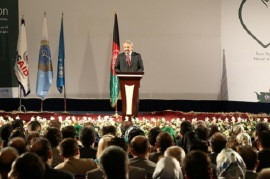
Conference reviews country’s progress in maternal and child health
For Immediate Release
KABUL, Afghanistan, 10 May 2015 – Afghanistan’s Ministry of Public Health, donors and international experts gathered today to review the country’s progress in maternal and child health, and identify ways to save over 35,000 lives of children with cost-effective, high-impact health interventions by 2020.
The three-day ‘Call to Action’ conference will include the launch of major new studies demonstrating how interventions such as skilled birth attendance at delivery, care of newborns, new vaccines to reduce childhood diarrhea and respiratory infections and improving the nutrition of children can decrease maternal and child deaths in Afghanistan.
“During the past decade significant improvement has been made in maternal and child health, which has brought dramatic decrease in maternal mortality ratio from 1,600 to 327 per 100,000 live births and under five mortality rate from 257 to 97 per 1,000 live births,” declared HE. Dr. Abdullah Abdullah CEO of National Unity Government in his inaugural speech of the conference. “And on behalf of National Unity Government of Afghanistan I promise our commitment to support our health sector in order to improve maternal and child health in Afghanistan.”
“This is an historic event, where the Government of Afghanistan, partners and technical experts will publicly renew the promise to save the lives of mothers and children and to reach our targets for 2020,” said H.E. Firozuddin Feroz, Minister of Public Health for Afghanistan, at the launch event. “We will review our progress, agree on a way forward, and promote accountability in delivery of services and reporting results.”
UNICEF Representative Akhil Iyer spoke on behalf of the United Nations in Afghanistan. “The fact that one child in every ten in Afghanistan dies before they reach their fifth birthday is wholly unacceptable,” he said. ”The fact that most Afghan women, and especially those in remote areas, do not have access to health care services, must change. Together, we can end preventable maternal and child deaths. It is within our power to make a difference.”
William Hammink, USAID Mission Director, spoke on behalf of donors. “As donors, we stand with you as you take this step to renew the promise to save lives,” said Hammink. “The analysis from this conference is based on evidence about which health interventions will reap the greatest benefit. Together we will commit to find ways to bring those interventions to Afghans across the country including the poorest and the most remote areas.”
H.E. Abdullah Abdullah, Chief Executive Officer of Afghanistan and Dr. Firozuddin Feroz officially opened the ‘Call to Action’ conference. Featured speakers included internationally renowned statistician Professor Hans Rosling, co-founder of the Gapminder Foundation and one of TIME magazine’s 100 most influential people in 2012. Professor Zulfiqar A. Bhutta, renowned researcher and public health expert from Aga Khan University presented an in-depth case study on the progress and current challenges to improving the maternal and child health situation in Afghanistan.
The conference will conclude on Tuesday with the signing of the Kabul Declaration when the government and partners will commit to health and nutrition strategies and programmes to accelerate the reduction of maternal and under-5 infant mortality in Afghanistan.
Visit the website: http://www.calltoactionafghanistan.org/







Comment
Make a general inquiry or suggest an improvement.